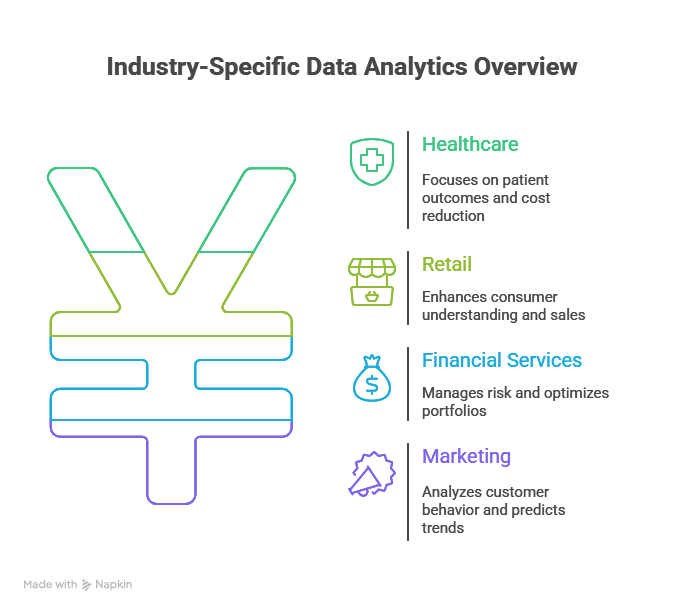Discover Leading Data Analytics Service Providers in the US
Are businesses leveraging their data effectively to drive decision-making? In today’s fast-paced business landscape, the ability to analyze and interpret complex data is crucial for success.
Top data analytics firms are revolutionizing the way companies operate, providing actionable insights that inform strategic decisions. As a result, leading data analytics services have become indispensable for businesses aiming to stay ahead of the competition.
By partnering with the right data analytics service providers, organizations can unlock the full potential of their data, driving growth, improving efficiency, and enhancing customer experiences.
The Strategic Importance of Data Analytics Service Providers
The modern business environment demands swift and informed decision-making, a challenge that expert data analytics consultants are well-equipped to address. By leveraging their expertise, businesses can transform their data into actionable insights.
How Professional Data Analytics Providers Transform Business Decision-Making
Professional data analytics providers play a crucial role in enhancing business decision-making processes. They offer advanced analytics capabilities, enabling companies to gain a deeper understanding of their operations, customers, and market trends.
Key Benefits of Partnering with Expert Data Analytics Consultants
Partnering with expert data analytics consultants offers numerous benefits, including:
- Enhanced analytical capabilities
- Access to cutting-edge technologies
- Improved strategic planning
Improved Decision-Making Capabilities
- Professional data analytics consultants assist organizations in enhancing their decision-making processes by delivering actionable, data-driven insights. This enables companies to make informed decisions, reducing the risk of relying on intuition alone.
Cost-Effective Access to Advanced Analytics Tools
- Data analytics service providers offer cost-effective access to advanced analytics tools, eliminating the need for significant upfront investments in technology and talent. This allows businesses to leverage sophisticated analytics capabilities without incurring substantial costs.
How to Assess Your Organization’s Data Analytics Requirements
To effectively utilize data analytics, it’s essential to first understand your organization’s specific needs. Assessing your organization’s data analytics requirements is a foundational step that can significantly impact the success of your analytics initiatives.
Identifying Critical Business Questions for Data Analysis
Industry-focused analytics firms provide specialized solutions tailored to sectors like healthcare, finance, and retail. This involves understanding the key challenges your organization faces and determining how data can be used to address these challenges.
For instance, you might ask: “What are the primary drivers of customer churn?” or “How can we optimize our supply chain operations?” By clearly defining these questions, you can focus your analytics efforts on delivering actionable insights.
Evaluating Your Current Data Infrastructure
Next, evaluate your current data infrastructure to determine its capability to support your analytics needs. This includes assessing the quality, availability, and accessibility of your data.
Defining Clear Objectives for Your Analytics Initiative
Defining clear objectives is crucial for the success of your analytics initiative. This involves setting both short-term and long-term goals.
Short-Term Analytics Goals
Short-term goals might include improving operational efficiency or enhancing customer experience through targeted marketing campaigns.
Long-Term Data Strategy Planning
Long-term data strategy planning involves aligning your analytics initiatives with your overall business strategy, ensuring that your data analytics capabilities continue to support your organization’s growth and evolution.
By following these steps, organizations can effectively assess their data analytics requirements and set themselves up for success in their analytics initiatives.
Navigating the Landscape of Data Analytics Service Providers
Understanding the diverse landscape of data analytics service providers is crucial for businesses seeking to leverage data effectively. The market offers a wide range of options, from comprehensive consultancies to specialized analytics firms.
Full-Service Data Analytics Consultancies
Full-service data analytics consultancies provide end-to-end solutions, from data strategy to implementation. These firms offer a broad spectrum of services, including data integration, analytics platform setup, and advanced analytics capabilities.
Cloud-Based Analytics Providers (AWS, Azure, Google)
Cloud-based analytics providers like AWS, Azure, and Google Cloud offer scalable and flexible analytics solutions. These platforms enable businesses to process large datasets, leverage machine learning models, and gain insights through data visualization tools.
Specialized Industry-Specific Analytics Firms
Industry-focused analytics firms provide specialized solutions tailored to sectors like healthcare, finance, and retail. These firms bring deep domain expertise, enabling businesses to tackle industry-specific challenges through tailored analytics solutions.
Analytics as a Service (AaaS) Companies
Analytics as a Service (AaaS) companies provide analytics capabilities on a subscription basis. This model allows businesses to access advanced analytics without significant upfront investments.
Subscription-Based Analytics Models
Flexible subscription-based models allow companies to scale their analytics capabilities according to changing requirements.
Custom Analytics Solution Providers
Custom analytics solution providers develop tailored solutions to meet specific business requirements. These providers work closely with clients to understand their unique challenges and develop targeted analytics strategies.
By understanding the different types of data analytics service providers, businesses can make informed decisions about which services best meet their needs.
Step-by-Step Process to Evaluate Top Data Analytics Firms
To find the best data analytics service provider, businesses must follow a structured evaluation process. This involves several key steps that help organizations assess potential providers and make an informed decision.
Researching Potential Data Analytics Service Providers
The first step is to research potential data analytics service providers. This involves identifying firms that have experience in your industry and possess the necessary technical capabilities. Companies can start by reviewing industry reports, such as the Gartner Magic Quadrant, to identify top data analytics firms.
Reviewing Case Studies and Client Testimonials
Once a list of potential providers is compiled, the next step is to review case studies and client testimonials. This helps businesses understand the provider’s past performance and their ability to deliver results. By examining these materials, companies can gain insights into the provider’s strengths and weaknesses.
Examining Industry Recognition and Gartner Magic Quadrant Positioning
Industry recognition, such as positioning in the Gartner Magic Quadrant, is a crucial factor in evaluating data analytics firms. This report provides an independent assessment of a provider’s capabilities and market position. Companies should look for firms that are recognized as leaders in the Gartner Magic Quadrant.
Understanding Provider Technical Capabilities
Technical capabilities are essential for a data analytics service provider. Businesses should assess the provider’s technology stack, data management capabilities, and analytics tools. This ensures that the provider can meet the organization’s specific needs and deliver high-quality services.
Assessing Industry Experience and Expertise
Industry experience and expertise are vital when selecting a data analytics firm. Companies should evaluate the provider’s experience in their specific industry and their ability to understand unique business challenges. This ensures that the provider can offer tailored solutions that meet the organization’s needs.
How to Create an Effective RFP for Data Analytics Service Providers
To find the ideal data analytics service provider, it’s essential to develop an RFP that clearly outlines your project scope and expectations. A well-crafted RFP is crucial for identifying the right partner who can drive business success through data-driven insights.
Defining Your Project Scope and Requirements
Clearly defining your project scope is the foundation of an effective RFP. This involves outlining the specific data analytics needs of your organization, including the type of data to be analyzed, the analytics tools required, and the expected outcomes.
- Identify the key business questions that need to be addressed through data analytics.
- Clearly define the project scope, including which data sources will be utilized and the analytics methods to be applied.
- Outline the specific requirements for the project, such as data processing capabilities and reporting needs.
Specifying Technical and Business Objectives
Your RFP should clearly specify both the technical and business objectives of your data analytics project. This includes detailing the technical infrastructure required to support the analytics initiative and the business outcomes you aim to achieve.
Technical objectives may include the implementation of specific data analytics tools or platforms, while business objectives could involve improving operational efficiency or enhancing customer insights.
Setting Clear Evaluation Criteria
Establishing clear evaluation criteria is vital for assessing potential data analytics service providers. This involves defining the factors that will be used to evaluate proposals, such as the provider’s experience, technical capabilities, and pricing models.
Budget Considerations and Pricing Models
When evaluating potential data analytics service providers, it’s essential to consider budget constraints and pricing models. Your RFP should outline the budget for the project and specify the preferred pricing structure, whether it’s based on a fixed fee, hourly rate, or outcome-based pricing.
Timeline and Deliverable Expectations
Clearly outlining the project timeline and deliverable expectations is crucial for ensuring that the selected service provider can meet your needs. This includes specifying the milestones, deadlines, and reporting requirements for the project.
By following these guidelines, you can create an effective RFP that attracts the right data analytics service providers for your organization, ensuring a successful partnership that drives business growth.
Comparing Leading Cloud-Based Data Analytics Services
Leading cloud-based data analytics platforms, including AWS, Azure, and Google Cloud, offer businesses unparalleled insights and scalability. These services have become crucial for organizations looking to leverage their data effectively.
AWS Analytics Services for Business Intelligence
AWS provides a comprehensive suite of analytics services that enable businesses to analyze data, gain insights, and make informed decisions. Key services include Amazon Redshift for data warehousing, Amazon QuickSight for fast business intelligence, and Amazon Rekognition for deep learning-based image and video analysis.
Microsoft Azure Analytics Solutions and Integration Options
Microsoft Azure offers a robust analytics platform that integrates seamlessly with other Azure services and Microsoft products like Office 365. Azure Synapse Analytics (formerly SQL Data Warehouse) provides limitless analytics capabilities, while Azure Stream Analytics enables real-time data processing.
Google Cloud Analytics Platform Capabilities
Google Cloud’s analytics services are designed to provide businesses with actionable insights. Google BigQuery is a fully managed enterprise data warehouse that supports ultra-fast SQL queries leveraging Google’s cloud infrastructure. Google Cloud Dataflow is another key service that allows for the processing of streaming data.
Real-Time Data Processing Features
- AWS: Amazon Kinesis for real-time data processing and analysis.
- Azure: Azure Stream Analytics for real-time data processing.
- Google Cloud offers Dataflow for efficient processing of streaming data.
Machine Learning Integration Options
All three platforms offer robust machine learning integration options. AWS has Amazon SageMaker, Azure provides Azure Machine Learning, and Google Cloud offers AI Platform (formerly known as Google Cloud Machine Learning Engine).These platforms enable organizations to develop, train, and deploy machine learning models at scale.
When choosing a cloud-based data analytics service, businesses must consider their specific needs, including the type of data they are working with, their analytics requirements, and their existing infrastructure. By understanding the strengths and capabilities of AWS, Azure, and Google Cloud analytics services, organizations can make informed decisions that drive their business forward.
How to Select Industry-Specialized Data Analytics Service Providers
Selecting the right industry-specialized data analytics service provider is crucial for businesses seeking to leverage data-driven insights. Different industries have unique challenges and requirements, making it essential to choose a provider with expertise in your specific sector.

Healthcare Data Analytics Vendors and Solutions
In the healthcare industry, data analytics is used to improve patient outcomes, optimize treatment plans, and reduce costs. Healthcare data analytics vendors offer solutions such as predictive analytics for disease diagnosis, personalized medicine, and operational efficiency improvements.
Retail Analytics Providers for Consumer Insights
Retail analytics providers help businesses understand consumer behavior, preferences, and shopping patterns. They offer solutions such as customer segmentation, demand forecasting, and inventory optimization to enhance the retail experience and drive sales.
Financial Services Analytics Specialists
Financial services analytics specialists provide solutions for risk management, compliance, and portfolio optimization. They use advanced analytics techniques such as machine learning and predictive modeling to help financial institutions make informed decisions.
Marketing Analytics Service Providers and Capabilities
Marketing data analytics service providers offer a range of capabilities, including customer behavior analysis and predictive analytics applications. These tools help businesses understand their customers better, anticipate their needs, and develop targeted marketing strategies.
Customer Behavior Analysis Tools
Tools for analyzing customer behavior allow businesses to gain insights into how clients interact with their products, services, and brand. These tools provide insights into customer preferences, behaviors, and pain points, enabling businesses to develop more effective marketing strategies.
Predictive Analytics Applications
Predictive analytics leverages historical data and statistical modeling to anticipate future trends and behaviors. In marketing, predictive analytics can be used to anticipate customer churn, identify new sales opportunities, and optimize marketing campaigns.
Implementing Analytics as a Service with Reliable Data Analytics Specialists
In today’s data-driven landscape, leveraging Analytics as a data analytics service providers with trusted data analytics specialists is crucial for informed decision-making. As organizations seek to derive actionable insights from their data, the adoption of Analytics as a Service (AaaS) is becoming increasingly prevalent.
Understanding the Analytics as a Service Business Model
The AaaS business model provides organizations with cloud-based analytics solutions, eliminating the need for upfront capital expenditures on hardware and software. This model is particularly beneficial for businesses looking to scale their analytics capabilities without significant infrastructure investments.
Key Benefits for Different Organization Sizes
For small and medium-sized enterprises (SMEs), AaaS offers a cost-effective entry point into advanced analytics. Larger organizations benefit from the scalability and flexibility that AaaS provides, allowing them to adapt quickly to changing business needs.
Implementation Strategies and Best Practices
Successful AaaS implementation requires careful planning. Key considerations include:
- Assessing existing data infrastructure
- Defining clear analytics objectives
- Selecting the right AaaS provider
Data Integration Considerations
Effective data integration is critical for AaaS success. Organizations must ensure seamless connectivity between their existing data sources and the AaaS platform.
Security and Compliance Requirements
When implementing AaaS, businesses must prioritize data security and compliance. This includes ensuring the AaaS provider meets relevant regulatory standards and implements robust security measures.
By understanding the AaaS business model, recognizing its benefits, and following best practices for implementation, organizations can harness the full potential of Analytics as a Service. This enables them to make data-driven decisions, drive business growth, and maintain a competitive edge in their respective markets.
Maximizing ROI from Your Data Analytics Service Providers
Maximizing ROI from data analytics investments requires a multifaceted strategy that encompasses several key elements. To achieve the highest possible return on investment, businesses must focus on establishing clear KPIs, creating effective data governance frameworks, and building internal capabilities to complement external services.
Establishing Clear KPIs for Analytics Initiatives
Establishing clear KPIs is crucial for measuring the success of data analytics service providers initiatives. According to
“You can’t manage what you don’t measure,”
Peter Drucker
a renowned management consultant. KPIs should be aligned with business objectives and should include metrics such as revenue growth, cost reduction, and improved customer satisfaction.
- Revenue growth through data-driven decision-making
- Cost reduction by optimizing operations
- Improved customer satisfaction through personalized experiences
Creating Effective Data Governance Frameworks
Effective data governance is essential for ensuring the quality, security, and compliance of data used in analytics. A well-structured data governance framework helps in maintaining data integrity and supports the overall analytics initiative.
Building Internal Capabilities to Complement External Services
Building internal capabilities is vital for maximizing ROI from data analytics service providers. This involves staff training and skill development, as well as creating a data-driven culture within the organization.
Staff Training and Skill Development
Investing in staff training and skill development on data science solutions ensures that employees can effectively utilize data analytics tools and insights. This includes training programs focused on data analysis, interpretation, and visualization.
Creating a Data-Driven Culture
Fostering a data-driven culture encourages the use of data insights in decision-making processes across the organization. As
“Data is the new oil,”
Clive Humby
a mathematician and data scientist, highlighting the importance of data in driving business success.
Emerging Trends in Affordable Data Analytics Solutions
The landscape of data analytics is rapidly evolving with emerging trends in affordable solutions. As businesses continue to seek data-driven insights, data analytics service providers are innovating to meet these demands.
Artificial Intelligence and Machine Learning Integration
One of the significant emerging trends is the integration of artificial intelligence (AI) and machine learning (ML) into data analytics. This integration enables more sophisticated data analysis, predictive modeling, and automated decision-making processes.
Real-Time Analytics Capabilities from Top Providers
Top data analytics service providers are now offering real-time analytics capabilities, allowing businesses to respond quickly to changing market conditions. This trend is particularly valuable in industries where timely insights can significantly impact business outcomes.
Predictive and Prescriptive Analytics Advancements
Predictive and prescriptive analytics are becoming more prevalent, helping businesses not only forecast future trends but also recommend actions to achieve desired outcomes.
- Predictive analytics uses historical data to forecast future events.
- Prescriptive analytics suggests actions based on predictive insights.
Edge Analytics and IoT Integration
Edge analytics, coupled with IoT integration, is enabling real-time data processing at the edge of the network, reducing latency and improving the efficiency of data analysis.
Natural Language Processing for Data Analysis
Natural Language Processing (NLP) is being used to make data analysis more accessible, allowing users to query data using natural language and receive insights in a more understandable format.
Conclusion: Selecting the Right Data Analytics Service Providers for Long-Term Success
Selecting the right data analytics service providers is crucial for businesses aiming to achieve long-term success in today’s data-driven landscape. By understanding your organization’s data analytics requirements and navigating the complex landscape of service providers, you can make informed decisions that drive business growth.
Carefully evaluating top data analytics firms, creating effective RFPs, and comparing leading cloud-based services are essential steps in this process. By implementing analytics as a service with reliable specialists and maximizing ROI through clear KPIs and effective data governance, businesses can unlock the full potential of their data.
As emerging trends like artificial intelligence, real-time analytics, and predictive analytics continue to shape the industry, staying ahead of the curve is vital. By choosing the right data analytics service providers, businesses can ensure they are well-equipped to tackle future challenges and achieve long-term success in an increasingly competitive market.
FAQ
What are data analytics service providers, and how can they benefit my business?
Data analytics service providers are companies that offer data analysis services to help businesses make informed decisions. They can benefit your business by providing expertise in data analysis, improving decision-making capabilities, and offering cost-effective access to advanced analytics tools.
How do I assess my organization’s data analytics requirements?
To assess your organization’s data analytics requirements, identify critical business questions for data analysis, evaluate your current data infrastructure, and define clear objectives for your analytics initiatives. Data analytics service providers can assist in this assessment.
What types of data analytics service providers are available?
There are various types of data analytics service providers, including full-service data analytics consultancies, cloud-based analytics providers like AWS, Azure, and Google, specialized industry-specific analytics firms, and analytics as a service (AaaS) companies.
How do I evaluate top data analytics firms?
To evaluate top data analytics firms, research potential providers, review case studies and client testimonials, examine industry recognition and Gartner Magic Quadrant positioning, and assess their technical capabilities and industry experience.
What is analytics as a service, and how can it benefit my organization?
Analytics as a service is a business model that offers data analytics capabilities on a subscription basis. It can benefit your organization by providing scalable and cost-effective access to advanced analytics tools, improving decision-making capabilities, and streamlining analytics processes.
How can I maximize ROI from my data analytics service providers?
To maximize ROI from your data analytics service providers, establish clear KPIs for analytics initiatives, create effective data governance frameworks, and build internal capabilities to complement external services. This can include staff training and skill development, as well as creating a data-driven culture.
What are the emerging trends in data analytics?
Emerging trends in data analytics include artificial intelligence and machine learning integration, real-time analytics capabilities, predictive and prescriptive analytics advancements, edge analytics, and IoT integration, as well as natural language processing for data analysis.
How do I create an effective RFP for data analytics service providers?
To create an effective RFP for data analytics service providers, define your project scope and requirements, specify technical and business objectives, set clear evaluation criteria, and consider budget and pricing models, as well as timeline and deliverable expectations.
What are the benefits of partnering with industry-specialized data analytics service providers?
Partnering with industry-specialized data analytics service providers can offer tailored solutions that meet the specific needs of your industry, providing expertise and knowledge that can drive business success.
How can cloud-based data analytics services benefit my organization?
Cloud-based data analytics services can benefit your organization by providing scalable and cost-effective access to advanced analytics tools, improving decision-making capabilities, and offering real-time data processing features and machine learning integration options.















